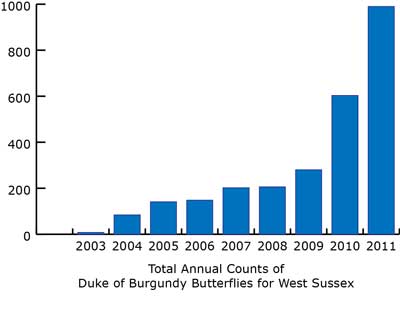This letter from the Chairman of the Sussex Branch of Butterfly Conservation highlight's a massive problem for our organization's work which will result from the Government's latest cuts. It is published on our sightings page: http://www.sussex-butterflies.org.uk/sightings.html
I urge UK residents to write to your MP, who can be contacted easily using http://www.writetothem.com/
-----------------------------------------------
Disproportionate Government Cuts Threaten Butterfly Conservation's Work
Our Chief Executive Dr Martin Warren recently wrote to me with the shocking news that Natural England (NE) is slashing its grant to Butterfly Conservation (BC) by a massively disproportionate 85%, amounting to a reduction of more than £250,000 in funding. We must all shoulder our fair share of the financial difficulties suffered as the economy falters and we appreciate that NE itself has lost staff (and will lose more) as the result of the 30% cuts it faces over the next three years. However, it is the disproportionate nature of the cut in the Species Recovery Grant to BC which causes me so much concern. For sixteen years this grant has funded our species action plans and a hugely diverse array of projects which have been successful in conserving butterflies and moths. This has come just as it appears we are turning the tide in our battle to halt and reverse many declines, as borne out by recent data.

The driving force behind this move appears to be the new England Biodiversity Strategy (EBS), which places far less emphasis on species conservation and far more on habitat conservation and landscape/ecosystem. Landscape scale conservation can be interpreted in more than one way. It is certainly important to continue species conservation on a landscape scale, ensuring that habitats and populations can be linked across large swathes of the countryside; this is something that BC has advocated for many years. It can also mean the more recently adopted holistic approach to the management of 'whole habitats', such as chalk grassland or broad-leaved woodland, and this approach has been widely adopted at the expense of more traditional species conservation. For several years now, based on what I have seen with my own eyes, I have been arguing that both the old and new philosophies must be run hand-in-hand. Where only the modern holistic approach is adopted the majority of fauna and flora will thrive, even the vast majority, but there have already been local casualties amongst those species which are most at risk, and there will be more. Traditional, species-focused conservation must be continued as an equal priority, fully funded, if we are to continue the sort of successes shown by BC Sussex Branch in conserving the Duke of Burgundy butterfly (see histogram). Too great a shift away from one approach to the other will only manage to reduce biodiversity, by shaving off the corners where the 'awkward' species sit. It is a matter of balance and we appear to be losing it. There is much to be commended in the EBS; it is not wrong, it is lacking.
The proposed 85% cut in the grant to BC presents other very significant threats to our work in conserving butterflies, moths and their habitats. BC is an organisation of 17,000 members, with volunteers running the more than thirty regional branches. Many more individuals are actively involved in hands-on conservation work, giving more than 150,000 volunteer days per year with a value of £9.5 million. All of this relies upon a small, central body of professional staff. Such a nucleus is essential in providing the structure, support and guidance to the much larger voluntary sector. This is a good example of where 'Big Society' congregates around smaller organisations such as BC, so it seems strange that the government should promote 'Big Society' on one hand, but pull the rug from beneath its feet with the other.
Volunteers like me and many others I know, who give a huge amount of time every year to this cause, find this all very dispiriting. I very much hope that the Environment Secretary will reconsider these proposals as a matter of extreme urgency.
What can we do?
I have written along these lines to both the Environment Secretary Caroline Spelman and my local MP Peter Bottomley (Worthing West). You may wish to write to your MP. Click here to see a template letter written by our Chief Executive Dr Martin Warren. If you wish to register your views please either use this template or construct your own letter from the information provided in these two documents.
Neil Hulme (Butterfly Conservation Sussex Branch Chair & West Sussex Conservation Officer)
Neil Hulme (Butterfly Conservation Sussex Branch Chair & West Sussex Conservation Officer)

No comments:
Post a Comment
Please select 'Name/URL' from 'Comment as' drop down box and add your name, thanks.